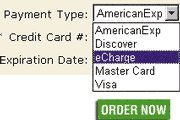Charging into Japan
Back to Contents of Issue: April 2001
|
|
|||||||||||||||||||
|
by Daniel Scuka |
|||||||||||||||||||
The eCharge system is certainly simple enough to use, and avoids the complexity of competing e-wallet systems or the banana-bucks kitsch of cash alternatives. Individual customers register with eCharge and establish an account that can either be used like a credit account (presently charging some 2.9 percent interest in the US; no rate announced for Japan yet) or a debit account (customers can prepay any amount they like). Settlements occur monthly, and in the US, payments can be withdrawn from a customer's bank account, or billed to a credit card or phone bill (a similar system should be easy enough to establish in Japan). Merchants likewise register, and then add a small eCharge applet to their ecom Web pages; site visitors who are eCharge members can select "eCharge" as their payment option, and a pop-up box prompts them to enter their eCharge ID and their secure pass phrase (the company claims a pass phrase is substantially more secure than a password). The transaction is then transferred to eCharge's servers for settlement and authorization, with the merchant receiving real-time electronic certification that funds have been credited to its account (so that the goods or services can be shipped right away). eCharge serves as the trusted third party between consumer and merchant, authenticating both the buyer and the seller in each transaction, and holding the payment in escrow. Buyers can also expect enhanced security and privacy because individual billing information is not sent to the merchant. eCharge claims to use proprietary encryption methods together with the highest level of SSL security software, making online transactions significantly safer than using a credit card. eCharge Japan CEO Masahiro Kawahata is bullish on the concept. "The eCharge virtual credit and debit card system is simple and secure," he says. Kawahata also confirms that the Japan subsidiary is actively looking for partners, a clear prerequisite based on US experience, where the parent company has worked hard to sign up big names like AT&T, Cable & Wireless, and EDS for infrastructure, as well as several dozen merchants sites for sales. Peter Hussey, president of security solution provider Baltimore Americas (a partner with eCharge US partner EDS), says "partnerships are what this space is all about." He explains that to be successful, "one must build a virtual network of organizations to deliver a differentiated services."
But Flath is cautiously optimistic about eCharge's chances, especially the service's prepaid account feature, which he expects to be especially popular with Japanese surfers. Prepaid phone, train, subway, and other cards were pervasive in Japan long before they became popular in the US, and individuals here are familiar with them and favor them, helping to avoid the adverse selection problem mentioned earlier. "My guess is that the prepayment of accounts holds the most potential in Japan. This will attract those who wish to buy products over the Net while preserving their anonymity to a degree not possible with credit card payments," says Flath. Toshihiro Kiribuchi, former deputy commissioner at the Ministry of Finance's Bureau of International Affairs and now senior advisor to Omron Corp., agrees that eCharge could be on track. He says that a service that helps prevent fraud, offers secure, guaranteed payment, and provides lower payment fees (credit card transaction fees here can be as high as 9 percent) is key to developing e-commerce and e-auctions in Japan. "Already, Yamato and many banking institutions are providing escrow services, in some cases combined with delivery services," he says. eCharge also faces a steep public education curve. On the Net in general, there remains considerable confusion regarding purchasing, payment, and security, especially in the B2C sector. While corporations have their security experts to provide guidance, consumers are barraged with all kinds of information regarding the security (or lack thereof) of online transactions, and it can be difficult for most consumers to sort out fact from fiction. "There's a growing acceptance of value-added payment and settlement services around the world. They provide a necessary service that will enhance consumer confidence in doing business on the Net," says Baltimore's Hussey.
eCharge's best options may lie on Japan's wireless Net, where the network operators presently retain a monopoly over e-commerce in a system that looks a lot like eCharge's (purchases are billed to the mobile subscriber's phone bill). CEO Kawahata says the company is looking at the wireless services, and there's little competition right now for third-party payment systems. A service that can be offered via Web site registration and then used with a single click could be very attractive for keitai users, who in many cases still struggle with tiny keypads. Newer models of Java-enabled mobile phones will be able to provide SSL security right from the handset, so perhaps eCharge can easily adapt its secure technology for the small screen. In the end, the success or failure of any online payment method depends little on technology. It's all about consumer confidence. Kawahata, for one, has lots of that confidence. "Japan is a good market for Net-based payment systems," he says. Time will tell.
|
|||||||||||||||||||
Note: The function "email this page" is currently not supported for this page.







